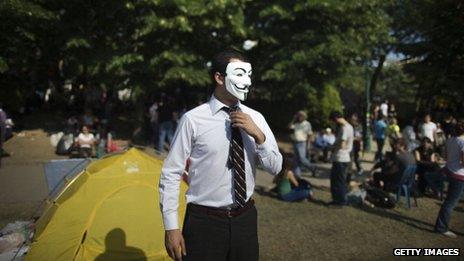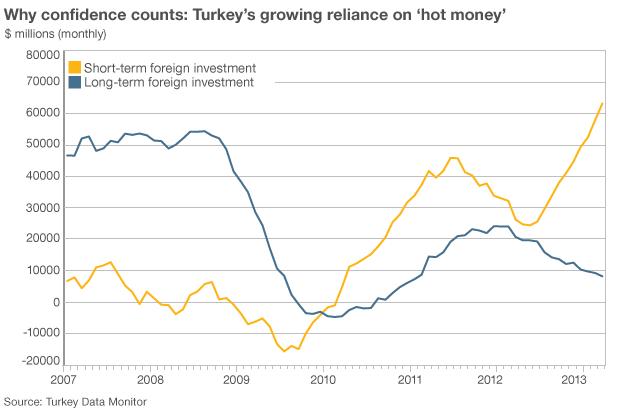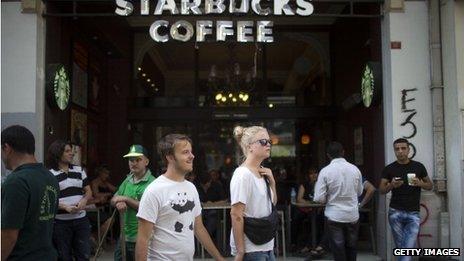Turkey protests reveal fault-lines in economic success
- Published
Jeremy Bowen reports on the moment stocks fell inside Turkey's stock exchange
Spooked by the unfolding anti-government protests across major cities in Turkey, thousands of foreign businessmen and women invited to attend a medical conference in Istanbul this month cancelled at the last minute.
Eda Ozden, an employee at a travel agency that organises events for Fortune 500 companies, said on top of the recent cancellations for the medical event, clients have called seeking advice on what to do about events booked in two years' time.

Travel agent Eda Ozden is worried about repercussions across the services industry
"That's very bad. The impact is wide - from hotels, bus and taxi companies, restaurants," she told the BBC.
"Tourism so far has only taken a hit in the short run. But... June being the highest season for tourists in Turkey, the industry is afraid. This has happened previously with 9/11, the 2003 Istanbul bombings and the 1999 earthquake. It took until 2005 for our companies to become profitable again."
While the impact of the demonstrations on the economy appears to be limited to a part of the tourism industry for now, even a small bump can be magnified in a country where much of the economy hinges on the services sector.
The service sector makes up 63% of the country's GDP. Turkey is the sixth most popular destination in the world, having attracted 31 million tourists in 2011 and valuing the industry at $30bn.
"It doesn't help that there are photos [in the media] showing the smoke-filled lobby of the InterContinental," said Ms Ozden, adding that the tourism industry was trying to assuage fears by promoting the protests as a healthy symptom of a working democracy.
Turkish businesses are nervous, uncertain whether the protests are causing just a blip in an otherwise stellar economic performance or putting them on the cusp of a damaging decline.
Jitters were particularly felt in Turkey's stock market, which plunged by more than 10% on Monday - its sharpest drop in 10 years - as investors, many of them foreign, started to pull their money out of the country.
Stocks continued their descent on Thursday after Prime Minister Recep Tayyip Erdogan said he would go ahead and root up Gezi Park and replace it with a shopping mall - a plan that had originally sparked the unrest.
Turkey's economic growth has skyrocketed since the early 2000s - around the same time Mr Erdogan's Justice and Development Party (AKP) assumed power - after implementing austerity measures advised by the International Monetary Fund. The 1990s had been spent in gloomy stagnation.
'Hot money'

White-collar office employees joined the protests after work
While a politically conservative party, the AKP championed a more liberal view of the economy, opening it up to global financial markets and privatising state assets - moves that earned strong supporters in the business community.
In 2011, while most Western economies were feeling the effects of the financial crisis, Turkey's growth rate was 8.5%, helped by reforms - for example, relaxing barriers for start-ups and companies, and removing travel visas for Russian citizens to boost tourism.
Growth declined sharply last year to 2.5% as the global economy stalled, but the IMF expected the situation to improve "barring new external shocks".
Foreign companies were lured by the perceived political stability under Mr Erdogan's decade-long rule: Microsoft, Coca-Cola, McKinsey, Boston Consulting Group and clinical research groups set up regional headquarters in Istanbul.
The US drugs company Pfizer last month announced it was moving its European Union headquarters from Brussels to Istanbul.
It also helped that credit rating agencies upgraded their ratings on Turkey's sovereign debt - Fitch gave it investment grade last November for the first time in 19 years.
But much of the growth in the past decade has masked a fragility - a dependency on external debt, which, at a moment of crisis can leave a country dangerously exposed to market volatility and the whims of investors. Short-term investment from abroad has surged in recent years, while long-term investment has fallen.

High domestic interest rates attracted short-term foreign capital. That pushed up the value of the Turkish lira, making imports cheaper and sparking a boom in demand for foreign goods.
That was good for the growing Turkish middle-class. But the influx of short-term foreign money - known as hot money - meant that the prosperity relied on speculative investors from abroad.
Analysts say the country needs $200bn a year to finance its current account deficit and maturing foreign debt. Since the start of the year, 60% of this sum has been financed by this hot money. Another 20% came from banks borrowing abroad.
Net external debt stands at $413bn, or about 51% of GDP. Goldman Sachs analysts last month described Turkey as one of the most debt-laden economies "in the emerging-market universe".
"The influx of foreign capital and growth gave the perception of stability. Now that stability is under question, which puts the influx under question, and throws the 'economic miracle' in doubt," said Ergin Yildizoglu, a columnist for the Cumhuriyet newspaper.
Tolga Esin, a tech entrepreneur and founding partner of Formondo, an e-commerce and mobile app platform, said businesses were concerned but could withstand the current level of the protests - up to a point.
'Nuclear economic winter'

Some parts of Istanbul have returned to normal
"Foreign investment has played such a major role that if there is panic or concerns about the Turkish economy, then that would be devastating," he said.
"I don't think that will happen at this point - unless or until things get worse."
But for another businessman in his 30s, who goes to work in the mornings and joins other protesters in the evenings, the short-term turbulence in markets or in some areas of the economy are a necessary sacrifice to bring about fundamental change in a government that has overstepped its authority.
The BBC's James Reynolds looks at how the crisis has escalated
"Until now, foreigners looked at Turkey through a lens that the AKP party wanted them to see" as a peaceful nation and an economic success story, he said, speaking on condition of anonymity because he was afraid of reprisals.
"Internally, we had doubts about how we were ruled. But now the world can see that the AKP is very powerful - and not nice," he added.
The direction of the protests - and the economy - will depend on the government's response.
Atilla Yesilada, a partner at GlobalSource, a research group, wrote in a blog post: "The AKP is at the threshold of the most delicate decision of its 11-year reign: How to handle the protests.
"This is not the Turkish Spring, but if the AKP presses the wrong button, it could become 'the nuclear winter of the economy'," he warned.
- Published6 June 2013
- Published6 June 2013
- Published6 June 2013
- Published12 June 2013